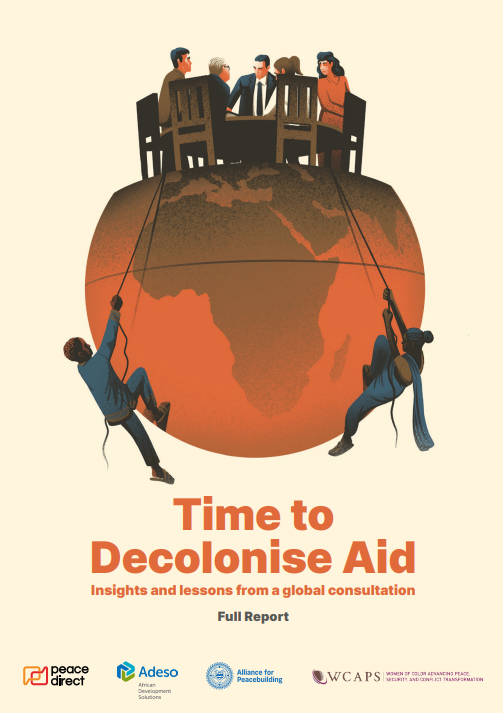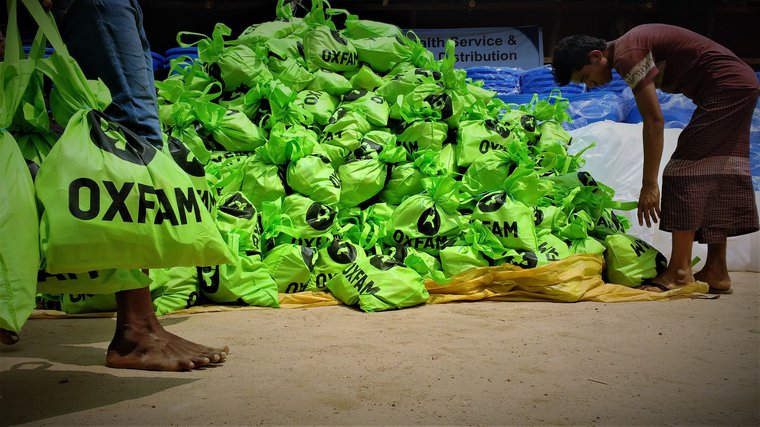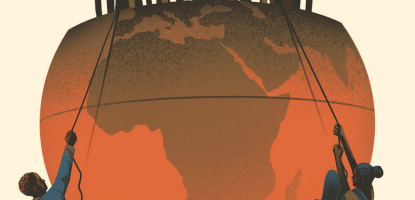While researching the decolonisation of aid communication, I have encountered multiple large aid organisations that have addressed their presence or support for decolonising aid. As the participation of large INGOs (International Non-Governmental Organisations) is essential to shift the power within the sector, this is excellent. However, it has got me wondering about the communicational strategies used in these initiatives. What are their true incentives? If we analyse the rhetorics of the communication efforts, will we find a performative act similar to greenwashing or a genuine drive for change?
One organisation that, as mentioned earlier, directly answered the open letter from the movement #ShiftThePower (2020) is Oxfam GB. In the article, CEO Danny Sriskandarajah (2020) discusses the changes that will be done within Oxfam GB to contribute to the decolonisation of the organisation. With the assistance of recommendations for INGOs who wish to decolonise the sector, created by an international consultation on decolonising aid, I will, in this post, examine the rhetorics of Sriskandarajah’s (2020) article “NGOs must decolonise aid relief, says Oxfam UK CEO”. The aim is to examine if Sriskandarajah’s words indicate legitimate will and measures to decolonise the structure and operations of Oxfam and if the actions he is taking align with the efforts requested by the Global South.

What is decolonisation?
Jansen, Osterhammel, and Riemer (2023, 1) consider decolonisation to be “a technical and rather undramatic term for one of the most dramatic processes in modern history: the disappearance of empire as a political form, and the end of racial hierarchy as a widely accepted political ideology and structuring principle of world order”. They explain that the word has a record of being used worldwide to describe these transformations as a synonym of concepts like ‘self-determination’ and ‘liberation’ (ibid. 3), when in reality, political elites have used this system to transfer their colonial ideas to ‘trustworthy’ local leaders along with the power of their nations. In other words, decolonisation was often a strategy of Europeans, driven by selfish political goals (ibid. 4). The processes are most often highly violent, resulting in civil wars and extreme brutality rather than peaceful political change (ibid. 5). Having this in mind, one could wonder how and why we would use the same term within the process of shifting the power within the aid sector.
Khan (2021) explains that decolonisation has become a buzzword in the industry, representing the shift of narratives from international agencies and organisations to local partners in the Global South. Unfortunately, he claims that the discussion has become one-sided. Like the original use of the process of decolonisation, Khan (2021) argues that using this Eurocentric term in the aid sector is yet again a Western strategy which excludes opinions and perspectives from the Global South. The proposal of ‘decolonise aid’ is, in Khan’s (2021) view, misleading as the term implies that aid is a kind of colonisation. It is further misleading as this particular process is a course-correcting of the sector’s operations and softening of power imbalances. If we were to really decolonise aid, in this sense, the aim would be to end the entire sector.
Global Consultation on Decolonising Aid
In his criticism, Khan (2021) calls for an urgent alternative representative of the viewpoint of the Global South. One organisation that has turned this criticism into action is the INGO Peace Direct. In 2020, the organisation, together with African Development Solutions (Adeso), the Alliance for Peacebuilding (AfP), and Women of Color Advancing Peace and Security (WCAPS), organised an online consultation on power dynamics and other imbalances within aid, development, and peacebuilding (Peace Direct et al. 2021, 4). Over three days, 158 actors (one being Khan, ibid. 13) from 49 countries and six continents discussed issues around the colonial legacy, the decolonisation agenda, and the normalised racism within the industry (ibid. 6). In line with the aim of the movement #ShiftThePower’s open letter to INGOs (#ShiftThePower 2020) and their Manifesto for Change (#ShiftThePower n.d.), which Peace Direct and Adeso is a part of, this online consultation aimed to identify approaches which could achieve a radical transformation of power relations to improve equity.
The international consultation settled a variety of shared opinions. For instance, most participants found that decolonising norms, systems, and institutions will take dedicated efforts and plenty of time (Peace Direct et al. 2021, 37).
“It is not enough to localise projects; if non-White, non-Western individuals do not hold structural power, the system will simply continue replicating itself, skewing global power dynamics ever more in favour of the Global North. Beyond tokenistic hiring or performative programmes, decolonisation requires existing norms be fundamentally disrupted and dismantled. It requires a commitment to the redistribution of power and resources.” (Peace Direct 2021, 37)
Many participants describe the process of decolonisation within the context of aid and development as the deconstruction of colonial ideologies and Western privilege, the creation of knowledge and solutions, the acknowledgement and unlearning of colonial patterns, and critical thinking of current practices (Peace Direct 2021, 13). With this definition, the consultation settled the necessity of decolonising the aid sector. The aim is to achieve sustainability within development and projects within peacebuilding and humanitarian aid (ibid, 37).

Recommendations to INGOs
The international consultation generated recommendations for decolonising aid within three categories: ‘Recommendations for donors, INGOs and policymakers’ (ibid, 38), ‘Recommendations for INGOs specifically’ (ibid. 40), and ‘Recommendations for individuals’ (ibid., 41). In this inquiry, the ‘Recommendations for INGOs specifically’ will be used to analyse the article “NGOs must decolonise aid relief, says Oxfam UK CEO” by Danny Sriskandarajah (2020) to analyse the content of Sriskandarajah’s rhetoric.
Below are the presented recommendations for INGOs who wish to decolonise aid, summarized.
1. End White-gaze fundraising
- Do not use derogatory images and condescending language.
- Review and improve internal and external communication strategies.
- Consider collaborations with local actors when documenting operations in the Global South.
2. Use progressive attitudes in organisational strategies
- Establish milestones for the shift in power and relocation of resources to local organisations.
- Set clear targets for supporting indigenous civil society organisations: at least 25% of funding should go to local organisations, with larger targets to come.
3. Avoid localisation spin
- Having a group of locally employed personnel does not make an organisation local. Avoid reframing localisation to defend the collaboration of an organisation.
- In organisational cooperations with INGOs, use communication efforts to show this identity and the power that the INGO possesses.
4. Re-evaluate partnerships with local organisations
- Avoid short-term project collaborations and establish long-term partnerships.
- Review existing partnerships, preferably through “Peace Direct’s nine partnership principles of effective partnerships” (Peace Direct 2021, 40).

Oxfam GB
The article “NGOs must decolonise aid relief, says Oxfam UK CEO” (Sriskandarajah 2020) was, as formerly discussed, written as a response to #ShiftThePower’s (2020) piece “An open letter to International NGOs who are looking to ‘localise’ their operations”. Sriskandarajah (2020) published the article on the website ‘Open Democracy’, agreeing with activists that large organisations have failed to share their power with the Global South. As the CEO of Oxfam GB, he discusses the organisation’s new strategy to “re-balance power more fairly – within our own Oxfam GB organisation, within the larger Oxfam confederation, and within wider movements” (Sriskandarajah 2020).
Whilst Sriskandarajah (2020) makes excellent points in his article, I wish to attempt to explore it from the perspective of the Global South. As an answer to #ShiftThePower’s (2020) open letter, one would expect Sriskandarajah to have read their manifesto and adapted Oxfam GB’s new strategy to accommodate their wishes. Let us look at how well his article matches the recommendations from the global consultation on decolonising aid.
When examining whether Sriskandarajah (2020) addresses the topic of white-gaze funding, recommendation number 1 (Peace Direct et al. 2021, 40), the answer is, unfortunately, no. Not addressing changes in communication measures does, of course, not entail that Oxfam GB uses white-gaze funding. However, it would have been beneficial to carry through a revision of the organisation’s internal and external communication efforts. Firstly, to show continuous improvement. Secondly, adopting collaborative strategies and producing alternative approaches is an excellent way to shift the power in communication efforts (ibid).
Regarding progressive attitudes in organisational strategies, Sriskandarajah’s (2020) rhetoric is vague. He discusses the transformation of the Oxfam confederation to be a “diverse and equal global network” and the decolonisation of “how aid is funded and delivered, by shifting from models that perpetuate power imbalances to ones that unite people outraged at injustice” (Sriskandarajah 2020). However, no attention was brought to eventual clear milestones or targets for the shift in resources and power to local organisations, which the participants of the global consultations were particular about (Peace Direct et al. 2021, 6).
Sriskandarajah (2020) explains that the changes within the organisation are driven particularly by the necessity of supporting and amplifying local action to strengthen civil societies. He argues that this requires “strong foundations and on-site builders to work from the ground up” (Sriskandarajah 2020). Unfortunately, this rhetoric reflects quite a lot of localisation spinning within the organisation, as on-site builders are not a synonym for local actors. In Peace Direct’s (2021, 40) report, they specifically discuss that having a group of locally employed personnel does not make an organisation local. Sriskandarajah (2020) continues by writing that Oxfam GB will work on fewer issues and places, supporting communities to survive and challenge underlying causes. One could interpret this as a strategy mainly involving shipping out British staff to the location and calling the initiative local.
Further, Sriskandarajah (2020) explains that Oxfam GB wishes to “strengthen people’s power to drive their own change, supporting them with the resources they need”. To me, this does not sound like a relocation of resources. It sends out the message of a continued situation where the Global South must depend on large INGOs to get the resources they need. This would be against not only the recommendations in the Peace Direct (2021, 40) but also the desires of the #ShiftThePower movement overall.
With that said, Sriskandarajah (2020) expresses a desire to develop “more meaningful partnerships that genuinely shift money, decision-making and influence from funders and Oxfam to people in poverty”. This aim not only sounds progressive but gives a positive feeling about the future of their partnerships. In Peace Direct’s recommendations, reviewing existing partnerships and establishing long-term collaborations are highlighted (Peace Direct et al. 2021, 40). Circling back to the strategy of operating in fewer places and working with fewer issues, the future of Oxfam GB’s partnerships could potentially be promising after all.
Conclusion
As established by now, decolonising the aid sector will take time. It is a complex process, and it will require a persistent, joint effort between aid organisations and agencies and local actors on the receiving end. In this essay, I have examined the rhetoric strategies of the aid sector on the subject. Using Oxfam GB as a case, the multiple severe flaws of an actor who at first glance seems to be an ally to the movement to #ShiftThePower is startling. The desire to shift the power and decolonise the sector is there, but Sriskandarajah seems unwilling to carry out the required actions. The lack of milestones and targets and the presence of localisation spinning are alarming, as they portray an unwillingness to lose power over the Global South. One can only hope that Oxfam GB’s strategy to decolonise their organisation is constantly developing strategically and rhetorically and carrying out the initiatives they are promising. This case further makes you wonder how other large organisations are managing the decolonisation of the project and if their incentives might be faulty as well.
Reflections
This post is my last piece on this blog. Creating, designing, and writing on Digital Horizons has been rewarding in multiple ways. It was a great team-building exercise, and it was fun to share a platform with other programme students. I have gained significant knowledge of blogging and on the subject of decolonising aid, which I otherwise would have missed out on. As a former communication officer in different organisations and companies, I found this exercise to be a good practice for future professional missions, which I appreciate. Even if I have worked in WordPress before and done much writing, my knowledge has expanded. For that, I am grateful. I hope you have enjoyed reading my posts as much as I have enjoyed writing them. Thank you for your time!
References
#ShiftThePower. (2020, March 8). An open letter to International NGOs who are looking to ‘localise’ their operations. [Online]. Available at: https://www.opendemocracy.net/en/transformation/an-open-letter-to-international-ngos-who-are-looking-to-localise-their-operations/ [Accessed on: 2023-10-25].
#ShiftThePower. (n.d.). More Than a Hashtag: Manifesto for Change. Shift the Power. Available at: https://shiftthepower.org/more-than-a-hashtag/manifesto-for-change/ [Accessed on: 2023-11-03].
Jansen, J. C., Osterhammel, J., & Riemer, J. (2023). Decolonisation as Moment and Process. Decolonisation: A Short History. (pp. 1-34). Princeton University Press. Available at: https://doi.org/10.2307/j.ctvc77drk.4 [Accessed on: 2023-11-02].
Khan, T. (2023, November 3). Decolonisation is a comfortable buzzword for the aid sector. [Online]. Available at: https://www.opendemocracy.net/en/decolonisation-comfortable-buzzword-aid-sector/ [Accessed on: 2023-10-26].
Peace Direct, Adeso, Alliance for Peacebuilding, WCAPS, Women of Color Advancing Peace & Security and Conflict Transformation. (2021). Time to decolonise aid: Insights and lessons from a global consultation. Save the Children’s Resource Centre. [Online]. Available at: https://resourcecentre.savethechildren.net/pdf/time-to-decolonise-aid.pdf/ [Accessed on: 2023-10-25].
Sriskandarajah, D. (2023, November 3). NGOs must decolonise aid relief, says Oxfam UK CEO. [Online]. Available at: https://www.opendemocracy.net/en/ngos-must-decolonise-aid-relief-says-oxfam-uk-ceo/ [Accessed on: 2023-10-25].


